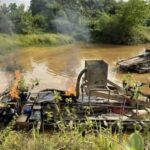
In the 1950s, the quiet fishing town of Minamata in Japan became infamous for one of the greatest environmental disasters of the 20th century. A chemical factory discharged methylmercury into the bay. The poison entered the fish, the fish entered the people, and the people fell into unimaginable suffering – trembling hands, twisted limbs, blind eyes, and children born with permanent deformities.
The world remembers it today as Minamata Disease – a tragedy written in mercury.
Ghana’s Rivers, Ghana’s Risk
Since 2017, when the Pra River turned into a muddy sludge, the alarm has been ringing in Ghana. Our rivers – Pra, Birim, Ankobra, Offin, Tano, Bia, and even tributaries of the Volta – are being poisoned daily by galamsey operations. The same mercury that crippled Minamata now flows in Ghanaian waters, silently accumulating in fish, cassava, rice, vegetables, and even the drinking water that reaches our homes.
The consequence is predictable. Hospitals are already recording kidney failures, cancers, birth defects, and neurological disorders. What we are seeing is only the beginning.
Parallels with Minamata
Source: Industrial greed in Japan, illegal mining greed in Ghana.
Pathway: Fish and crops – the very food that sustains us.
Impact: Neurological collapse, birth defects, and death.
Government Response: In both cases, denial, delay, and silence.Scale: Minamata was one bay, one city. Ghana risks an entire nation poisoned.
If Minamata was a local tragedy, Ghana’s galamsey threatens to become a national catastrophe.
The Cost of Inaction
Minamata taught the world a hard lesson: silence kills. The Japanese government ignored the cries of its people until the suffering was undeniable. By then, thousands were already doomed.
Ghana is treading the same path. Our leaders talk, form committees, and send task forces. Meanwhile, the toxins spread. Every day of delay brings us closer to a future where Ghana’s hospitals overflow with the broken bodies of children who never had a chance.
A Call to Action
- We must declare galamsey zones disaster areas and a state of emergency in those areas.
- We must criminalise the use of mercury with strict enforcement.
- We must mobilise citizens – not just soldiers – to defend our rivers and forests
- And if our leaders do not act, then we, the people, must rise. Mass protest, mass strike, and civic uprising are not luxuries anymore; they are the only language that power understands when lives are at stake.
Final Reflection
In my early 50s now. Can I tell my grandchild that I did my best to stop galamsey if she asks “if you knew about the problem all along, what did you do about it”? I have a child, a 12-year-old boy. If methylmercury doesn’t claim me before then, I might live to be 80 and become a grandfather. I’m not a pessimist. I’m not an optimist. I’m a possiblist. With galamsey, anything bad health is possible. If we allow galamsey to continue, what kind of world will our grandchildren inherit?
Minamata should have been enough warning for the world. Ghana cannot afford to become the next cautionary tale. The rivers are our veins, the soils our skin and right now, poison is flowing through them. To save our rivers, forests, and the land is to save ourselves.
Wasn’t Me | Steward to the Environment